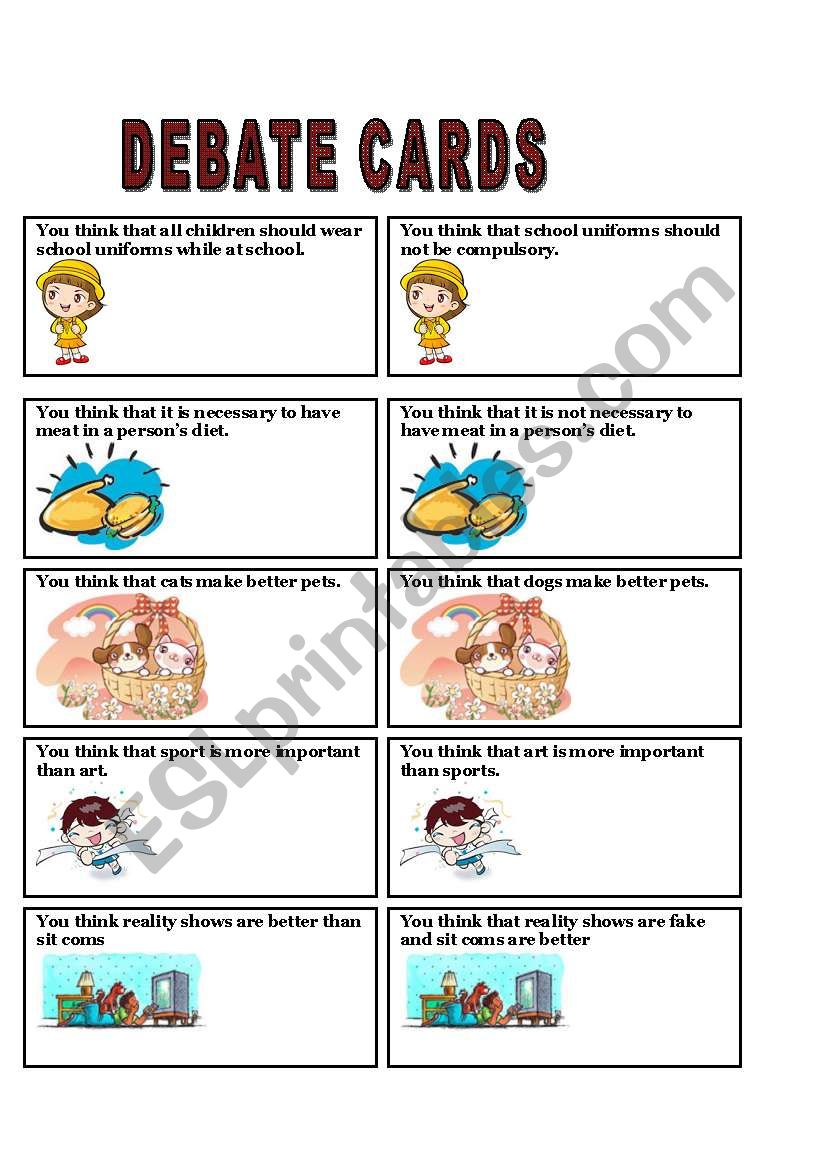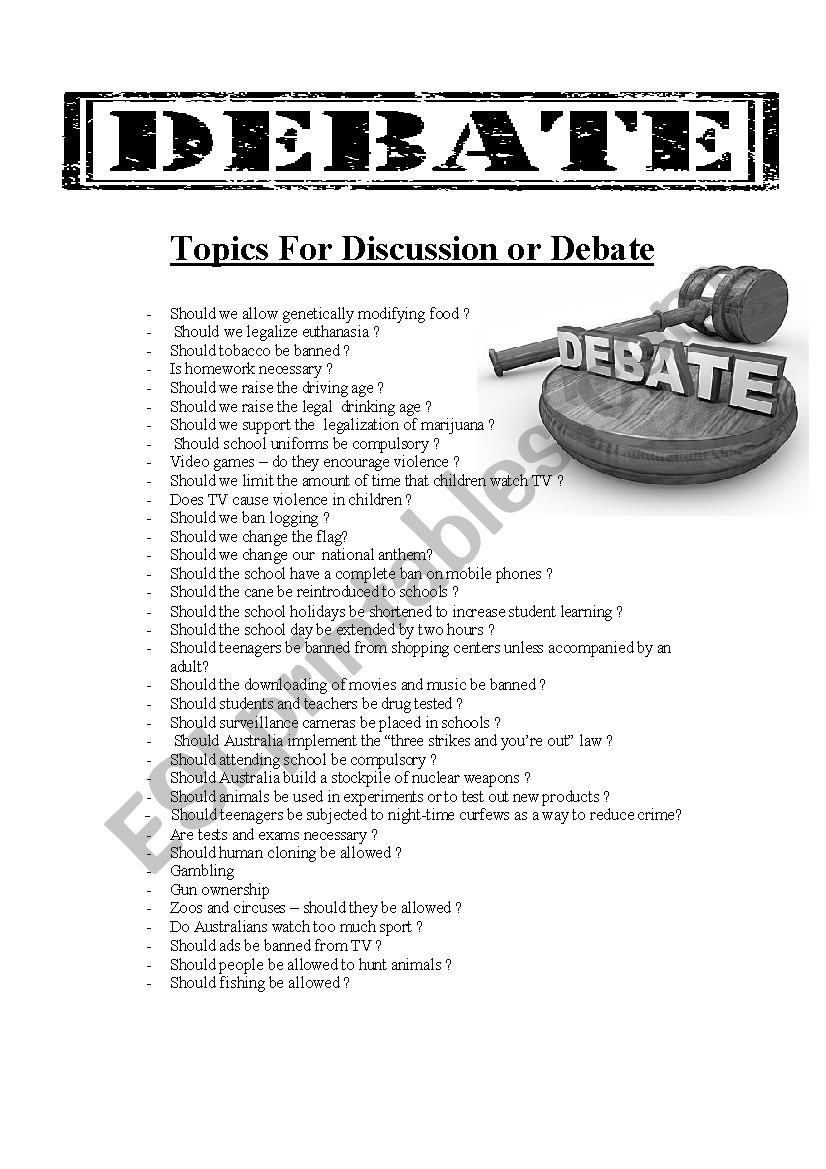
Unlocking Fluency and Critical Thinking: A Comprehensive Guide to Debate Topics for ESL Worksheets
Debate is more than just an intellectual exercise; it’s a dynamic and incredibly effective tool for language acquisition, especially for English as a Second Language (ESL) learners. It compels students to engage with the language in a meaningful, spontaneous, and analytical way, pushing them beyond rote memorization to true communicative competence. In this comprehensive guide, we will delve deep into the world of Debate topics for ESL worksheets, exploring why debate is so beneficial, how to structure a successful debate session, what makes a good topic, and provide a curated list of engaging subjects that are perfect for your ESL classroom.
Why Debate for ESL Learners? The Unparalleled Benefits

The benefits of incorporating debate into an ESL curriculum are multifaceted and far-reaching:

- Holistic Language Development: Debate demands the use of all four language skills:

- Speaking: Students must articulate their arguments clearly, persuasively, and coherently. They learn to use discourse markers, transition words, and persuasive language.
- Listening: Active listening is crucial to understand opponents’ arguments, identify weaknesses, and formulate rebuttals.
- Reading: Researching a topic requires reading comprehension, extracting key information, and understanding different perspectives. This is where well-designed Debate topics for ESL worksheets can guide students through research tasks.
- Writing: Preparing arguments, outlining points, and structuring rebuttals often involves pre-writing or note-taking, which strengthens writing skills.

- Critical Thinking and Problem-Solving: Debate forces students to analyze complex issues, evaluate evidence, construct logical arguments, and anticipate counter-arguments. This is a vital skill transferable to all areas of life.
- Vocabulary Expansion: Students naturally encounter and internalize new vocabulary related to the debate topic, as well as general academic and persuasive language. Worksheets can pre-teach or reinforce this vocabulary.
- Grammar in Context: Instead of isolated drills, students apply grammatical structures naturally to express complex ideas, use conditional clauses for hypothetical scenarios, or employ passive voice for emphasis.
- Confidence Building: Public speaking, especially in a second language, can be daunting. Debate provides a structured, supportive environment for students to overcome this fear, express their opinions, and gain confidence in their linguistic abilities.
- Cultural Understanding and Empathy: Debating controversial topics often requires students to consider different viewpoints, even those they disagree with. This fosters empathy and a deeper understanding of diverse perspectives.
- Engagement and Motivation: Unlike traditional lectures or drills, debate is inherently interactive and dynamic. The competitive yet collaborative nature of debate keeps students engaged and motivated to learn.
- Preparation for Real-World Communication: Whether it’s a job interview, a presentation, or a discussion with colleagues, the skills honed in debate are directly applicable to professional and social interactions.





Structuring a Successful ESL Debate Session with Worksheets
To maximize the benefits, a debate session needs structure. This is where Debate topics for ESL worksheets become invaluable tools, guiding students through each phase:
-
Pre-Debate (Preparation is Key):
- Topic Introduction: Clearly present the debate topic.
- Team Formation: Divide students into "affirmative" (for) and "negative" (against) teams.
- Brainstorming & Research: Provide worksheets that prompt students to brainstorm initial ideas, identify keywords, and suggest resources for research (e.g., online articles, encyclopedias).
- Vocabulary Building: Worksheets can include a list of essential vocabulary related to the topic, with definitions or matching exercises.
- Argument Outlining: This is crucial. Worksheets should guide students to:
- Identify their main arguments (usually 2-3).
- Provide supporting evidence or examples for each argument.
- Anticipate opposing arguments and plan rebuttals.
- Structure their opening statements and closing summaries.
- Role Assignment: Within teams, assign roles like lead speaker, researcher, summarizer, or rebuttal specialist. Worksheets can help define these roles.
-
During Debate (Facilitation and Rules):
- Clear Rules: Establish time limits for each speech (e.g., opening statements, rebuttals, closing statements) and rules for polite interruption or questions. A worksheet can serve as a rule reminder.
- Moderator: An appointed student or the teacher can act as a moderator, ensuring fairness and adherence to rules.
- Note-Taking: Provide worksheets for students not speaking to take notes on key arguments from both sides, helping them prepare for Q&A or evaluate later.
- Encourage Peer Feedback: After the debate, use a worksheet for peers to provide constructive feedback on clarity, persuasiveness, and language use.
-
Post-Debate (Reflection and Reinforcement):
- Debriefing: Discuss the debate. What were the strongest arguments? What was challenging?
- Vocabulary Review: Revisit new words encountered during the debate.
- Writing Follow-up: Have students write a summary of the debate, their personal opinion, or a persuasive essay on the topic.
- Self-Assessment: Worksheets can include self-assessment rubrics for students to reflect on their performance.
Characteristics of Good Debate Topics for ESL Worksheets
Selecting appropriate Debate topics for ESL worksheets is paramount. A good topic should possess several key characteristics:
- Controversial, but Not Overly Sensitive: There should be clear "for" and "against" positions, allowing for genuine disagreement. However, avoid topics that might cause deep personal offense, intense emotional distress, or violate cultural norms within your classroom.
- Relatable and Relevant: Topics that connect to students’ lives, experiences, or current events will naturally generate more interest and engagement.
- Accessible Language/Concepts: While debate introduces new vocabulary, the core concept should be understandable, or researchable, by students at their proficiency level.
- Sufficient Depth: The topic should allow for multiple arguments and sub-points, preventing the debate from ending too quickly due to a lack of material.
- Clear "Yes/No" or "Should/Should Not" Framing: A well-phrased debate topic usually presents a clear proposition.
- Avoids Purely Factual Debates: Debates are about arguments and perspectives, not just recalling facts. While facts support arguments, the core should be debatable.
A Curated List of Engaging Debate Topics for ESL Worksheets
Here’s a diverse selection of Debate topics for ESL worksheets, categorized for easy selection, along with a brief explanation of why they are suitable for ESL learners:
A. Everyday Life & School:
- "Should students be required to wear school uniforms?"
- Why for ESL: Highly relatable to most students, with straightforward arguments for (equality, discipline, focus on studies) and against (individuality, cost, discomfort). Excellent for beginners.
- "Should homework be abolished?"
- Why for ESL: Another universal student concern. Arguments revolve around learning effectiveness, stress, and leisure time. Encourages students to discuss their personal experiences.
- "Should social media be banned for teenagers under 16?"
- Why for ESL: Relevant to modern youth culture. Sparks discussions on privacy, mental health, communication, and information access.
- "Should pets be allowed in university dormitories?"
- Why for ESL: A lighthearted but engaging topic with clear pros (comfort, stress relief) and cons (allergies, noise, responsibility). Good for practicing polite disagreement.
- "Should all high school students be required to learn a second language?"
- Why for ESL: Directly relevant to ESL learners’ journey, allowing them to draw on their own experiences and opinions about language learning benefits and challenges.
B. Technology & Future:
- "Should artificial intelligence (AI) be used to grade student essays?"
- Why for ESL: Timely and thought-provoking. Discusses efficiency vs. human nuance, bias, and the future of education.
- "Should people be allowed to work from home permanently?"
- Why for ESL: Explores productivity, work-life balance, social interaction, and economic impacts. Very current.
- "Should self-driving cars be the only cars allowed on the road?"
- Why for ESL: Discusses safety, convenience, job displacement, and ethical dilemmas. Encourages speculative language.
- "Is online learning as effective as traditional classroom learning?"
- Why for ESL: Many ESL students have experience with both. Allows for comparison, advantages, and disadvantages of different learning environments.
- "Should privacy be sacrificed for national security?"
- Why for ESL: A more complex topic, requiring students to weigh rights vs. safety. Good for advanced learners to practice nuanced argumentation.
C. Society & Environment:
- "Should plastic bags be completely banned?"
- Why for ESL: Directly related to environmental issues. Arguments involve convenience, cost, alternatives, and ecological impact. Accessible.
- "Should fast food restaurants be banned near schools?"
- Why for ESL: Focuses on health, personal choice, and corporate responsibility. Relatable to students’ daily lives.
- "Should public transportation be free for everyone?"
- Why for ESL: Discusses economics, environmental benefits, social equity, and practicality. Encourages data-backed arguments.
- "Should governments impose a tax on sugary drinks?"
- Why for ESL: Debates personal freedom vs. public health. Involves economic and health-related vocabulary.
- "Should space exploration be prioritized over solving problems on Earth?"
- Why for ESL: A philosophical and grand-scale topic that encourages imaginative and ethical reasoning.
D. Ethics & Philosophy:
- "Is it ever acceptable to lie?"
- Why for ESL: Explores moral dilemmas and situational ethics. Simple premise, but allows for complex arguments and scenarios.
- "Should animal testing for cosmetics be banned globally?"
- Why for ESL: A common ethical debate with strong arguments on both sides (animal rights vs. human safety/innovation).
- "Should euthanasia be legal?"
- Why for ESL: A sensitive topic, but appropriate for advanced classes that can handle complex ethical and legal discussions maturely. Requires careful facilitation.
- "Is it better to live in a big city or a small town?"
- Why for ESL: Explores quality of life, opportunities, community, and personal preferences. Encourages descriptive language and comparisons.
- "Should convicted criminals have the right to vote?"
- Why for ESL: A topic that delves into civil rights, punishment, rehabilitation, and the definition of citizenship. Suitable for advanced learners.
Maximizing the Impact of Debate Worksheets
To ensure your Debate topics for ESL worksheets are truly effective:
- Scaffold Appropriately: For lower-level students, provide more structured sentence starters, vocabulary lists, and clear argument templates. For advanced students, offer more open-ended prompts that encourage independent research and critical thinking.
- Differentiate Roles: Assign different roles within teams to cater to varying strengths (e.g., strong speakers, good researchers, meticulous note-takers).
- Focus on Process, Not Just Winning: Emphasize clear communication, respectful disagreement, and logical argumentation over simply "winning" the debate.
- Integrate with Other Skills: Use debate as a springboard for follow-up writing assignments, vocabulary quizzes, or listening comprehension tasks.
- Make it Fun: Incorporate elements of friendly competition, peer recognition, and celebratory activities to keep motivation high.
Conclusion
Debate is an unparalleled pedagogical tool for ESL classrooms, fostering not just linguistic fluency but also critical thinking, confidence, and a deeper engagement with complex ideas. By carefully selecting and structuring Debate topics for ESL worksheets, teachers can transform their classrooms into vibrant arenas of intellectual exploration and effective communication. The right Debate topics for ESL worksheets provide the necessary scaffolding for students to articulate their thoughts, challenge assumptions, and ultimately, become more proficient and confident English speakers. Embrace the power of debate, and watch your ESL learners flourish.
